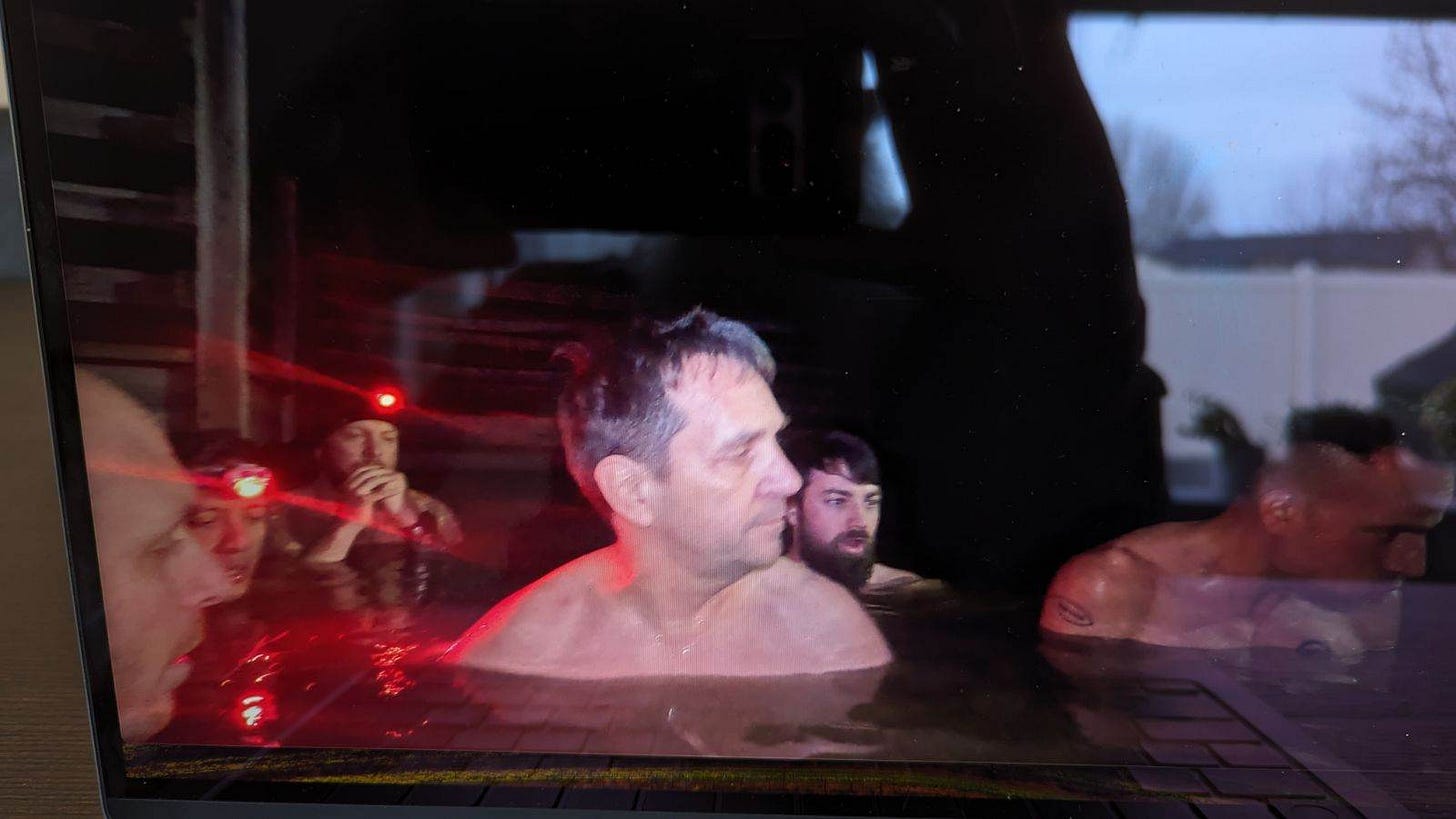Two ways to endure three minutes in bitterly cold water
A lifetime of lessons and all I had to do was shiver uncontrollably
Thank you for being a subscriber.
If you enjoy this newsletter, please consider recommending it to others and becoming a paid subscriber. You’ll get dispatches about travel, adventure and #dadlife that will sometimes be heartfelt and profound, sometimes peel back modern parenting life for a look inside, and sometimes be, well, whatever this is. If you want to support my work, I would appreciate it.
Heartwarming lessons from bitter cold
A few weeks ago I attended GRITT—GrowRuck Internal Team Training—an event for the leaders of GTE—GrowRuck Training Event, F3’s premier leadership training program.
Part of GRITT involved an extended polar plunge—participants had to spend three minutes up to our necks in 49-degree water. I’ve done a polar plunge before, and it was horrible. But all I had to do then was jump in and run out.
I dreaded this elongated polar plunge, in part because three minutes is forever in such circumstances, and in part because physiologically, I don’t handle the cold well. At a GTE event in 2019, after walking in a river and hiking overnight in rain, I sat down on a hill near the end of the event. I was shivering so violently the men around me rubbed my back to try to warm me up.
It was 70 degrees out.
At GRITT, after the plunge, we did a PT test, built part of an obstacle course and hiked overnight on the Appalachian Trail—a truly remarkable and unbelievably fun night. But my strongest memories are of misery of the water, what happened in it, and how we helped each other endure.
We split up into two groups, and mine entered the water first. When my feet, and then knees, and then waist hit that 49-degree water, I thought, oh shit. I’m not going to make it.
But the next six minutes taught me more about teamwork, endurance, perseverance and shared suffering than any multi-day event I’ve completed.
Team Hatfield, as my group was called, walked in until we were maybe chest deep. Then we sank into our necks, and the clock started.
Someone said something about controlling your breathing, letting your skin go numb, and then just simply enduring the misery, so I tried to do that. I involuntarily sucked in deep breaths followed by panicky short ones; I had no control over that, at least not at first.
After a few cycles, I gained control of it. Which is not to say I got used to the cold. Under water, my body shivered uncontrollably.
I concentrated on counting my breaths, thinking that would help me know when the 3 minutes was up. I was WAY off.
I didn’t say a word, which is unusual for me, both in general and when I’m under stress. Usually I prattle on (and on and on). I was concentrating so hard on not freaking out that I couldn’t engage in conversation. Meanwhile, the men around me talked gibberishy nonsense — guys, shut up, I’m trying to freeze to death over here.
Someone repeated “breathe in, breathe out” and asked if that was the lyrics to an REM song. I could not formulate an answer, never mind express it.
Then, suddenly, the night turned, and I have been trying to understand what happened ever since.
A member of Team Hatfield grabbed my arm. Something like electric currents radiated from that gentle touch, and the sensation was more than physical. It was relational. It didn’t remove me from the cold or warm me up. But it did take my mind off of my cold and put it on someone else’s cold.
There is someone else in here with me, I realized, and that someone is cold, too, and because of that, he is reaching out to me to help me. I looked around to figure out who was grabbing me and realized anew that there were not just one but 10 other somebodys in there. Until then, I would have said we were experiencing shared suffering. But it really would have been parallel suffering. Once he touched me, our suffering merged together like a rope, intertwined.
Later when I asked questions about who touched me, I found out that we had independently created a chain of human touch connections, livewires of personal, if not necessarily physical, warmth. Nobody knew anybody was touching anybody else. Kramer touched Urkel and Anaconda. Anaconda touched me because Kramer had touched him first and he wanted to pay that forward. Seagal was back-to-back with Gopher.
As Bones put it: “You don’t feel alone anymore.”
So that’s how the Hatfields endured the cold in lesson No. 1.
The McCoys entered the water right after us and taught lesson No. 2, which was every bit as valuable.
As they walked in, Flight Nurse started to tell a ridiculous joke about a horse. It’s the type of joke that takes as long as the teller wants. Because he knew they would be in the water for three minutes, Flight Nurse’s version of the joke took just about that long.
He distracted them right out of their coldness.

